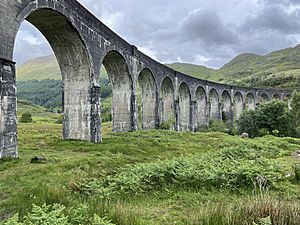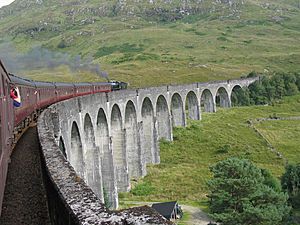Glenfinnan Viaduct facts for kids
Quick facts for kids Glenfinnan Viaduct |
|
|---|---|

The Jacobite steam train crossing the viaduct in 2022
|
|
| Coordinates | 56°52′35″N 5°25′55″W / 56.876285°N 5.431914°W |
| Carries | West Highland Line |
| Crosses | River Finnan |
| Owner | Network Rail |
| Characteristics | |
| Material | Concrete |
| Total length | 381 metres |
| Height | 30 metres |
| Longest span | 50 feet (15 m) |
| Number of spans | 21 |
| History | |
| Engineering design by | Simpson & Wilson |
| Constructed by | Robert McAlpine & Sons |
| Construction begin | 1897 |
| Construction end | October 1898 |
| Opened | 1 April 1901 |
The Glenfinnan Viaduct is a famous railway bridge in Scotland. It's located in a beautiful area called Glenfinnan, in the Scottish Highlands. This amazing bridge was built between 1897 and 1901. It crosses the River Finnan and offers stunning views of Loch Shiel and the Glenfinnan Monument. It's a key part of the West Highland Line, a railway track that runs through the Highlands.
Contents
Building the Glenfinnan Viaduct
The Glenfinnan Viaduct was built by a company called Robert McAlpine & Sons. Construction started in 1897. By October 1898, the viaduct was ready enough to help transport building materials across the valley. The total cost to build this impressive bridge was £18,904.
The West Highland Railway was built to Fort William by Lucas & Aird, but there were delays with the West Highland Railway Mallaig Extension (Guarantee) bill for the Mallaig Extension Railway in the House of Commons as the Tory and Liberal parties fought over the issue of subsidies for public transport. This Act did pass in 1896, by which time Lucas & Aird (and their workers) had moved south. New contractors were needed and Robert McAlpine & Sons were taken on with Simpson & Wilson as engineers. Robert McAlpine & Sons was headed by Robert McAlpine, nicknamed "Concrete Bob" for his innovative use of mass concrete. Concrete was used due to the difficulty of working the hard schist in the area. McAlpine's son Robert, then aged 28, took charge of construction, with his younger son Malcolm appointed as assistant.
Construction of the extension from Fort William to Mallaig began in January 1897, and the line opened on 1 April 1901.
The Mystery of the Horse
For a long time, there was a story that a horse fell into one of the viaduct's piers during its construction. This was said to have happened around 1898 or 1899.
In 1987, a professor named Roland Paxton looked for the horse. He used a special camera to check inside the largest piers of the Glenfinnan Viaduct. He didn't find any proof of a horse there.
Later, in 1997, based on local stories, he checked another nearby bridge, the Loch nan Uamh Viaduct. He used the same method, but found the piers were full of rocks. Finally, in 2001, using new scanning technology, the remains of a horse and cart were found! They were inside the large central support of the Loch nan Uamh Viaduct, not at Glenfinnan. So, the legend was true, but it happened at a different bridge!
How the Viaduct Was Designed
The Glenfinnan Viaduct is made from a material called mass concrete. This type of concrete doesn't have metal bars inside it like modern reinforced concrete. It's made by pouring concrete into molds. This makes it very strong when pushed, but not as strong when pulled apart.
The viaduct has 21 arches, each shaped like a half-circle. Each arch spans about 50 feet (15 metres). It is the longest concrete railway bridge in Scotland, stretching 416 yards (381 metres). The bridge crosses the River Finnan at a height of 100 feet (30 metres).
The railway line it carries is single track. The viaduct itself is 18 feet (5.5 metres) wide between its edges. It's also built on a curve, which makes it look even more interesting.
Trains That Use the Viaduct
The Glenfinnan Viaduct is part of the West Highland Line. This railway connects Fort William and Mallaig. This line was very important for the local fishing industry and the economy of the Highlands. It helped the area recover after the Highland Clearances of the 1800s.
Today, passenger trains run by ScotRail use the line. These trains travel between Glasgow Queen Street and Mallaig. They use Class 153 and Class 156 diesel multiple units.
In the summer, a special steam train called The Jacobite also uses the line. This steam train is very popular with tourists. The Glenfinnan Viaduct is one of the main attractions along its route. Another famous train, the Royal Scotsman, also travels on this line.
The Viaduct in Movies and Money
The Glenfinnan Viaduct is so famous that it has appeared in many films and TV shows. Some of these include Ring of Bright Water, Charlotte Gray, and Monarch of the Glen. It was also featured in Stone of Destiny and The Crown.
Most famously, the viaduct was used in four of the Harry Potter films. After it appeared in Harry Potter, many fans wanted to see it. The British Transport Police had to warn people not to walk on the viaduct. This was because some fans had come very close to being hit by trains.
The Glenfinnan Viaduct also appears in the 2018 video game Forza Horizon 4.
You can even find the Glenfinnan Viaduct on some Scottish banknotes! The Bank of Scotland issued a series of notes in 2007 that showed different bridges in Scotland. These bridges were chosen to highlight Scottish engineering. The £10 note proudly features the Glenfinnan Viaduct.
 | Tommie Smith |
 | Simone Manuel |
 | Shani Davis |
 | Simone Biles |
 | Alice Coachman |




